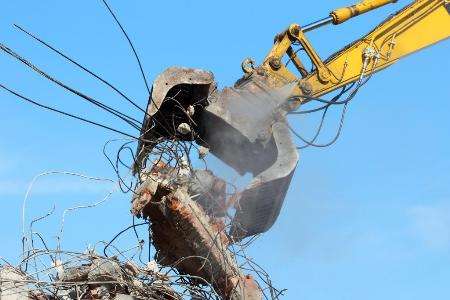New research project could slash construction waste destined for landfill

A pioneering project which could dramatically reduce the quantity of rubble from demolished buildings going to landfill is being developed at the University of the West of England (UWE Bristol).
Academics and industry partners are hoping to revolutionise the construction sector with their idea, which would see building materials earmarked for reuse or recycling at the design stage to prevent them ending up on the scrapheap.
They have secured an £800,000 grant to develop a sophisticated computer program capable of slashing the proportion of landfill in the UK originating from the construction industry, currently between 30 and 40 per cent.
Professor Lukumon Oyedele, Director of the Bristol Enterprise Research and Innovation Centre at UWE, believes the new approach could shave 10 per cent off total construction costs in the future as it will allow businesses to make savings on the purchase of new materials.
He said: "Landfill in the UK is getting reduced and reduced, and the Government is always keen on exploring ways it can divert waste from landfill. Thirty to forty per cent of waste going to landfill comes from the construction sector through construction waste and demolition waste.
"At the moment, at the end of a building's life, it is demolished. Some materials will be recycled, some will be remanufactured and some will go to landfill.
"With our tool, from the design stage of the building we want to look at the deconstruction plan. We want to look ahead to 20 or 30 or 50 years' time at the end of the building's life. It's about looking at the deconstruction plan now rather than when the building is being demolished."
Prof Oyedele said predictive analytics and big data would be used to forecast which materials can be reused or recycled once a building is ready to be pulled down.
The research project has been named DRIM (Deconstruction and Recovery Information Modelling). It will be worked on for two years from April 2016 in collaboration with academics from Coventry University and industry partnersWaste Plan Solutions Ltd and Sustainable Direction Ltd.
The funding for the project has been received from the Engineering and Physical Sciences Research Council and Innovate UK.
Prof Oyedele said: "It will change the entire construction industry – it's as simple as that. There's no tool at the moment that's coming up with a deconstruction plan.
"We want to develop this tool with the aim of having an impact on policy change so new buildings that need to be constructed in the future must submit a deconstruction plan as part of the planning permission requirements.
"We are extremely happy the bid was successful – it was very strong.
"It will be the first time deconstruction and demolition will be considered at the design stage. It will also support the UK Government industry targets. In terms of innovation, it is one of the few academic projects bringing cutting-edge, emerging technology into construction research, with big data analytics, 4D visualisation and semantic ontology.
"It will have an impact on the industry – helping achieve greater competitive advantage in the sector to create low-waste buildings."
It is hoped the new intelligence-based tool will lead to savings being made on landfill tax (currently £80 per tonne) and a reduction in landfill gases and CO2 emissions.
Provided by University of the West of England




















